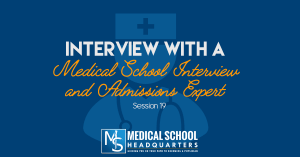Get 20% off a Single 1-on-1 Expert Advising Session Use it for ANYTHING! Learn More!

In today’s episode, I talk with Dr. Norma Wagoner. With almost 30 years of experience in the admissions process, she has served as the Dean of Admissions for multiple medical schools, such as Rush University, University of Chicago’s Pritzker School of Medicine, and the University of Colorado School of Medicine.
Today, she shares a ton of valuable information about the interview process, what medical schools are looking for in an application to get an interview, and what the admissions committee is looking for during the interview process.
You may have a standard interview or a Multiple Mini Interview (MMI); 15 schools in the US are now participating in MMIs.
Be careful if you wrote in your application that you speak fluent Spanish but you really don’t. They might conduct the entire interview in Spanish!
The University of Colorado uses partially blind interviews to focus on their criteria, looking at the student’s passions and goals, avoiding bias from grades and MCAT scores that pre-direct them to certain questions confirming why they should or shouldn’t take the students.
Build a little portfolio about each of the medical schools you're applying to, to help in your interview prep.Click To Tweet[Related episode: 5 Common Med School Interview Questions and How to Answer Them]
[Related episode: The MMI: Everything You Need to Know About the Multiple Mini Interview]

Lorem ipsum dolor sit amet, consectetur adipiscing elit
I just received my admission to XXXXX! This is unreal and almost feels like I am dreaming. I want to thank you for all of your help with my application. I cannot overstate how influential your guidance and insight have been with this result and I am eternally grateful for your support!
IM SO HAPPY!!!! THANK YOU SO MUCH FOR ALL YOUR HELP, IM INDEBTED TO YOU! Truly, thank you so much for all your help. Thank you doesnt do enough.
I want to take a few moments and thank you for all of your very instructive, kind and consistent feedback and support through my applications and it is your wishes, feedback, and most importantly your blessings that have landed me the acceptance!
I got into XXXXX this morning!!!! It still has not hit me that I will be a doctor now!! Thank you for all your help, your words and motivation have brought me to this point.
I wanted to once again express my heartfelt gratitude for your help in providing feedback during my secondary applications. Your guidance has been instrumental in my journey.
Just wanted to share my wonderful news! I received my first medical school acceptance! Thank you for all that you do for us Application Academy!!!
I am excited to tell you that I just got my third interview invite from XXXXX today! I can’t believe it. I didn’t even know if I was good enough to get one, let alone three – by mid-September. Thank you so much for all of your help and support up to this point; I would not be in this position without it!!
I wanted to thank you for helping me prepare for my XXXXX interview. Even in a 30-minute advising session, I learned so much from you. Thank you for believing in me, and here’s to another potential success story from one of your advisees!
I just received an acceptance with XXXXX! This is so exciting and such a huge relief and so nice to have one of our top choice schools! I also received an interview with XXXXX which brings the total up to 20 interviews! Thank so much, none of this would have been possible without you!

Join our newsletter to stay up to date
* By subscribing you agree to with our Privacy Policy and provide consent to receive updates from our company.
Resources
Advising Services
Podcasts & Youtube
Books
About
"*" indicates required fields